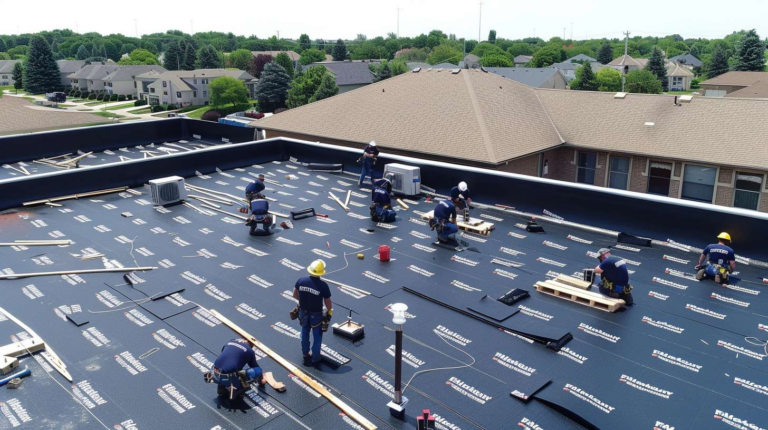Professional Patching Flat Roof Leaks Services You Can Trust
Look, I've been patching flat roof leaks across Queens for over two decades now, and I can tell you straight up - finding a leak is half the battle, fixing it properly is the other half. At Flat Masters NY, we've sealed thousands of flat roof leaks from Astoria to Jamaica, and I've seen every type of patch job you can imagine. The good, the bad, and the downright ugly temporary fixes that end up costing homeowners three times more down the road.
Here's the thing about patching flat roof leaks - it's not just about slapping some tar on a crack and calling it a day. That's what the fly-by-night guys do, and that's why we get so many calls fixing their "repairs" six months later.
Understanding Your Flat Roof Leak Problem
Every flat roof leak tells a story. Last Tuesday on 31st Street in Astoria, I climbed up on a customer's EPDM roof where three different contractors had attempted patches over the years. What a mess. The original leak was from a small puncture near the drain, but each patch job had created new problems because nobody addressed the root cause - poor drainage that was pooling water right where the membrane was weakest.
When I'm looking at how to patch a leaky flat roof, I start with the basics: where's the water coming from, where's it going, and what's the actual condition of the membrane? You can't just focus on the obvious wet spot because water travels. It might show up in your kitchen but the actual breach could be twenty feet away near a parapet wall or around penetrations.
Professional Patching Methods That Actually Work
The patching methods we use depend entirely on your roof type and the nature of the leak. For EPDM rubber roofs - which are everywhere in Queens - we typically use a combination of EPDM primer, patch material, and proper seaming techniques. None of this hardware store patch kit nonsense.
Modified bitumen roofs need a completely different approach. We're talking torch application or cold-applied systems depending on the situation. I remember one job in Elmhurst where the building owner tried to patch his mod bit roof with roofing cement. What should have been a $200 patch became a $3,000 membrane replacement because that cement actually accelerated the deterioration.
For TPO roofs, we use heat welding when possible. Carlos, my lead technician, has been perfecting TPO welding for fifteen years. He can create seams that are stronger than the original membrane. But here's what most people don't understand - TPO patches require precise temperature control and proper overlap specifications. Too hot and you burn through, too cold and it won't bond.
The Real Process of How to Patch a Flat Roof Leak
When someone asks me how to patch flat roof leak problems properly, I always start with inspection. Not just looking at the leak, but understanding the entire roof system. We check:
- Membrane condition and age
- Drainage patterns and ponding areas
- Flashing details around penetrations
- Seam integrity throughout the roof
- Insulation conditions if accessible
The actual patching process varies, but for a typical EPDM repair, we clean the area thoroughly, apply primer, install the patch with proper overlap, and then seal the edges. Sounds simple, right? But I've seen contractors skip the primer step and wonder why their patches fail after the first heavy rain.
Why DIY Flat Roof Leak Patches Usually Fail
I can't tell you how many times homeowners call us after trying to patch flat roof leak issues themselves. Look, I get it - you see a leak, you want to fix it fast and cheap. But flat roofing isn't like patching a bicycle tire.
The biggest mistake? Using the wrong materials. That rubberized coating you bought at Home Depot might stop the leak temporarily, but it's probably not compatible with your membrane. I've seen EPDM roofs where someone applied an asphalt-based product that actually dissolved the rubber over time.
And then there's the preparation issue. Professional patching a flat roof leak requires proper surface preparation. The area needs to be completely clean and dry. In Queens humidity, that often means waiting for the right weather conditions, not just slapping a patch on whenever you feel like it.
When Patching Isn't the Answer
Sometimes what looks like a simple patch job is actually a sign of bigger problems. If your flat roof is more than 20 years old and you're getting multiple leaks, patching might just be throwing good money after bad. We had a customer in Flushing who spent $1,800 on various patches over two years before finally accepting that the membrane was shot.
Here's my rule of thumb - if the patch area is going to be more than 25% of the total roof, or if you're dealing with multiple leaks across different areas, it's time to consider replacement. A good flat roof leak patch should last at least 10-15 years if done properly.
What Makes Our Patching Services Different
At Flat Masters NY, we don't just fix the immediate problem - we prevent future ones. When we're patching flat roof leaks, we're also evaluating the entire roof system. Maybe the leak is from a small puncture, but we notice that the drainage is creating conditions for more problems down the line.
We also use commercial-grade materials even for residential repairs. The EPDM patches we install are the same ones we use on major commercial projects in Long Island City. Why? Because your roof deserves the same quality whether it's a 500-square-foot house or a 50,000-square-foot warehouse.
Our warranties reflect our confidence in the work. A proper flat roof patch from us comes with a minimum 5-year warranty on materials and workmanship. Compare that to the guy who shows up with a pickup truck full of roofing cement.
Cost Considerations for Professional Flat Roof Leak Patching
Professional flat roof leak patching in Queens typically runs between $300-$800 for standard repairs, depending on the size and complexity. That might seem like a lot compared to a $30 tube of sealant, but consider this: our patches last years, not months.
Emergency leak repairs obviously cost more - we charge premium rates for same-day service because we're pulling technicians off other jobs. But if you can wait for normal scheduling, the costs are very reasonable compared to the damage that continued leaking can cause to your interior.
Seasonal Considerations in Queens
The salt air from the East River and LaGuardia flight patterns mean flat roofs in northern Queens face unique challenges. Winter freeze-thaw cycles are particularly brutal on membrane seams, which is why we see a surge of leak calls every spring.
Fall is actually the best time for non-emergency patching work. The weather is stable, materials perform better in moderate temperatures, and you're getting ahead of winter conditions. Plus, our schedule is more flexible before the spring rush hits.
Choosing the Right Contractor for Your Flat Roof Leak Patch
Not all roofing contractors understand flat roofs. Seriously. A guy who's great with shingles might be completely lost when it comes to membrane repairs. Make sure whoever you hire has specific flat roof experience and can show you examples of similar work.
Ask about their material suppliers too. We get our commercial-grade materials from Beacon on Northern Boulevard - they know us, they know our standards, and they stand behind their products. If a contractor is vague about where their materials come from, that's a red flag.
And please, get multiple quotes. But don't just compare prices - compare approaches. The cheapest option is rarely the best value when it comes to flat roof repairs.
When you're dealing with a flat roof leak in Queens, you need contractors who understand both the technical challenges and the local conditions. At Flat Masters NY, we've been solving these problems for over 20 years because we take the time to do it right the first time. Give us a call at (917) 994-7618 and let's discuss your specific situation. Your roof - and your peace of mind - deserve professional attention.


